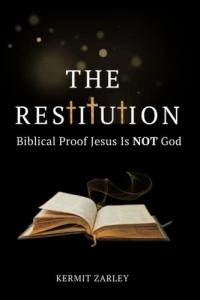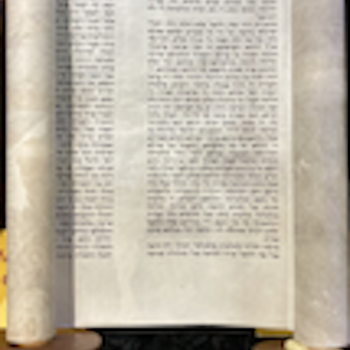 My favorite study for the past few decades has been what scholars called “Son of Man study.” It is mostly because, according to the four gospels of the New Testament, this is the title Jesus used by far the most to identify himself. Scholars agree that during the time that Jesus lived, and throughout much of history, this title Son of Man in Jewish literature was rather ambiguous, and that seems to be partly why Jesus used it.
My favorite study for the past few decades has been what scholars called “Son of Man study.” It is mostly because, according to the four gospels of the New Testament, this is the title Jesus used by far the most to identify himself. Scholars agree that during the time that Jesus lived, and throughout much of history, this title Son of Man in Jewish literature was rather ambiguous, and that seems to be partly why Jesus used it.
Son of Man study pretty much begins with its mention in the apocalyptic book of Daniel in the Jewish Bible (Old Testament). I regard it as second in importance only to the Shema. It is a vision Daniel had of which he says, “I saw one like a human being coming with the clouds of heaven. And he came to the Ancient One and was presented before him. To him was given dominion and glory and kingship, that all peoples, nations, and languages should serve him. His dominion is an everlasting dominion that shall not pass away, and his kingship is one that shall never be destroyed” (Daniel 7.13-14 NRSV).
Many scholars would further agree that Jesus’ practice of identifying himself as the Son of Man was due partly to what they call “the Messianic Secret.” This means that during Jesus’ itinerant ministry, he never identified himself to the crowds as the promised Messiah of Israel and only rarely did so privately. Even then, he also was somewhat ambiguous about it (e.g., John 4.21-26).
Eerdmans is publishing the first of two volumes of Richard Bauckham’s new book, Son of Man. It is scheduled to be released July 25th. According to at least one blurb on the back cover of this book, Son of Man study is about to gain a new threshold. Phillip Esler of the University of Gloucestershire, “Richard Bauckham’s volume on ‘Son of Man’ traditions in early Jewish literature is a masterpiece of exegetical inquiry. Bauckham digs deeply into a rich array of texts that interpret Daniel 7:13 … as referring to a human (not divine) figure who has previously lived on earth and whom God is preserving in heaven for an important future role.”
This is new information for me that is exciting since most, recent Daniel scholars have said Son of Man is not a human being or is an angel, thus negating the traditional interpretation that I hold to which is that it refers to the heavenly-exalted Jesus of Nazareth. Esler continues, “The volume represents a decisive new beginning for scholarship on the Jewish ‘Son of Man’ and necessitates close examination by anyone interested in this subject.”
This first volume is about Son of Man only in pre-Christian Jewish literature. Its main focus is on the apocalyptic books of Daniel and 1 Enoch, the latter a rich source for Son of Man study and the most prominent book in early Christianity that was not accepted as part of the New Testament canon.
Bauckham’s second volume, with no announced date of publication, will be solely about Son of Man study in the New Testament. That surely will be almost entirely about Jesus’ gospel sayings, since “Son of Man” or “one like the Son of Man” only appears three times in the rest of the New Testament.

Richard Bauckham was a leading New Testament scholar and researcher at Ridley Hall, Cambridge, England, before his retirement in 2007 at the University of St. Andrews (guess where the world’s most famous golf course is). Since then, he has then devoted himself fully to research and the writing of books. Bauckham is an conservative Anglican scholar who has specialized in Christology and the Gospel of John. Perhaps his most important book is Jesus and the Eyewitnesses. It is an important defense of the historical reliability of the New Testament gospels. In 2007, this book received the Christianity Today (magazine) award for biblical studies.
I have some of Richard Bauckham’s books in my library. I always look forward to reading his books. I once heard him present a paper at the Annual Meeting of the Society of Biblical Literature in which he interpreted the enigmatic “beloved disciple” in the Gospel of John as Jesus’ friend Lazarus, whom Jesus raised from the dead (John 11), rather than the common interpretation of the beloved disciple–the apostle John. Like most, I cling to interpreting the beloved disciple in the Gospel of John as the apostle John. I accept the trend in Gospel of John studies, that besides gathering oral tradition the apostle John was probably the major source for this gospel even though he likely did not write it and it may have had multiple editions.
 So, I plan to get this new book by Richard Bauckham when it launches and review it here on my blog. In the meantime, if this subject, Son of Man study, interests you, you could get a refresher course about it by reading the twenty pages about “Son of Man” in my recently republished magnum opus, The Restitution: Biblical Proof Jesus Is NOT God, now available at amazon.com. For a smaller, more accessible, and free treatment you could also read my blog post about it entitled “Who Is the Son of Man?“
So, I plan to get this new book by Richard Bauckham when it launches and review it here on my blog. In the meantime, if this subject, Son of Man study, interests you, you could get a refresher course about it by reading the twenty pages about “Son of Man” in my recently republished magnum opus, The Restitution: Biblical Proof Jesus Is NOT God, now available at amazon.com. For a smaller, more accessible, and free treatment you could also read my blog post about it entitled “Who Is the Son of Man?“













